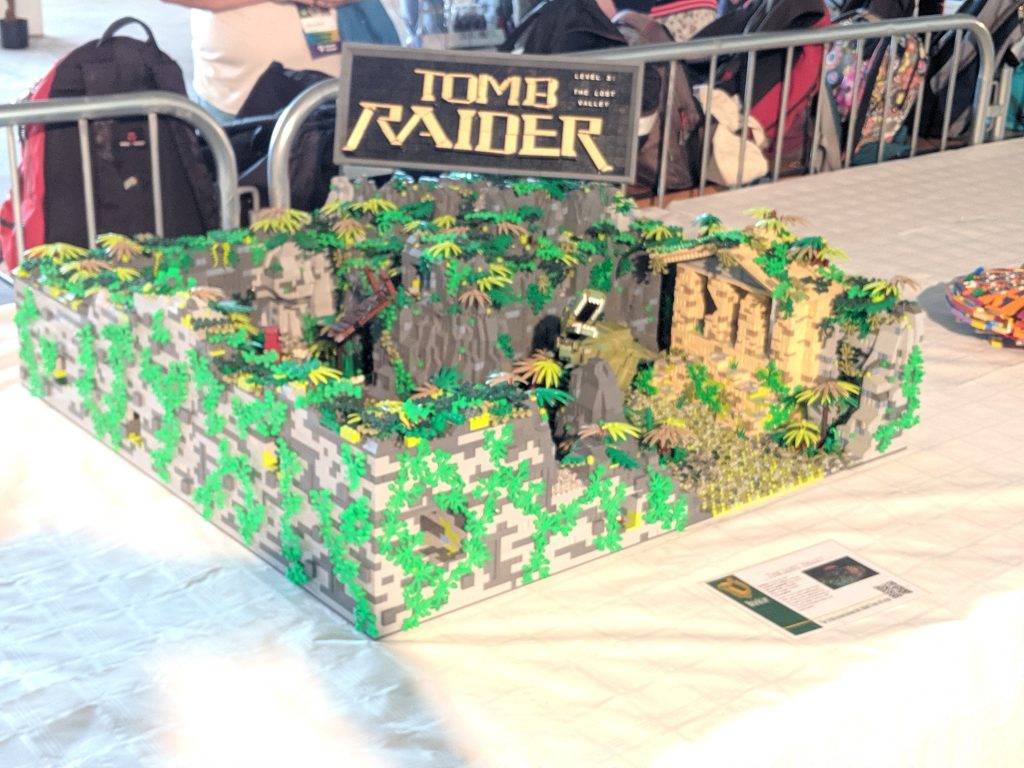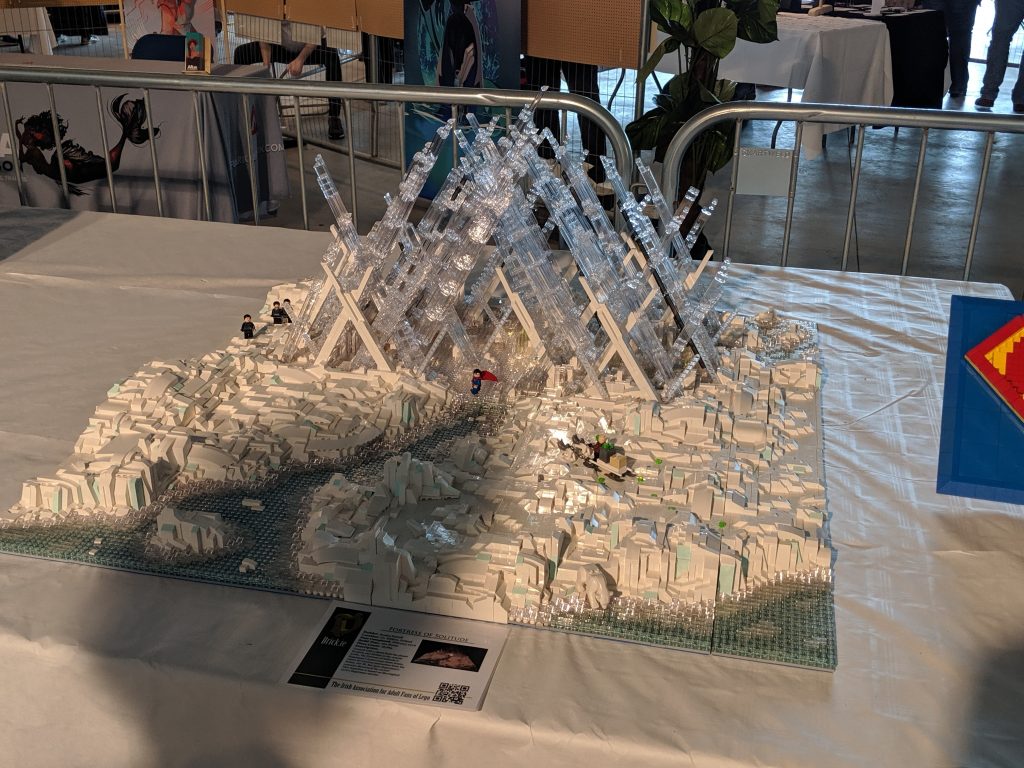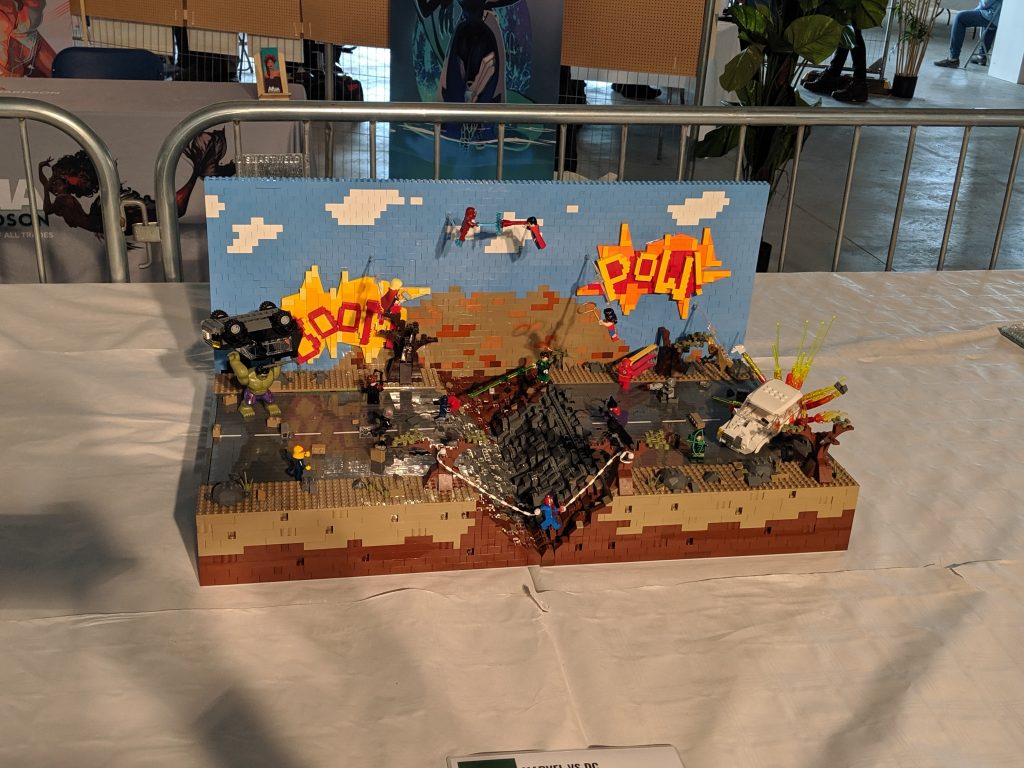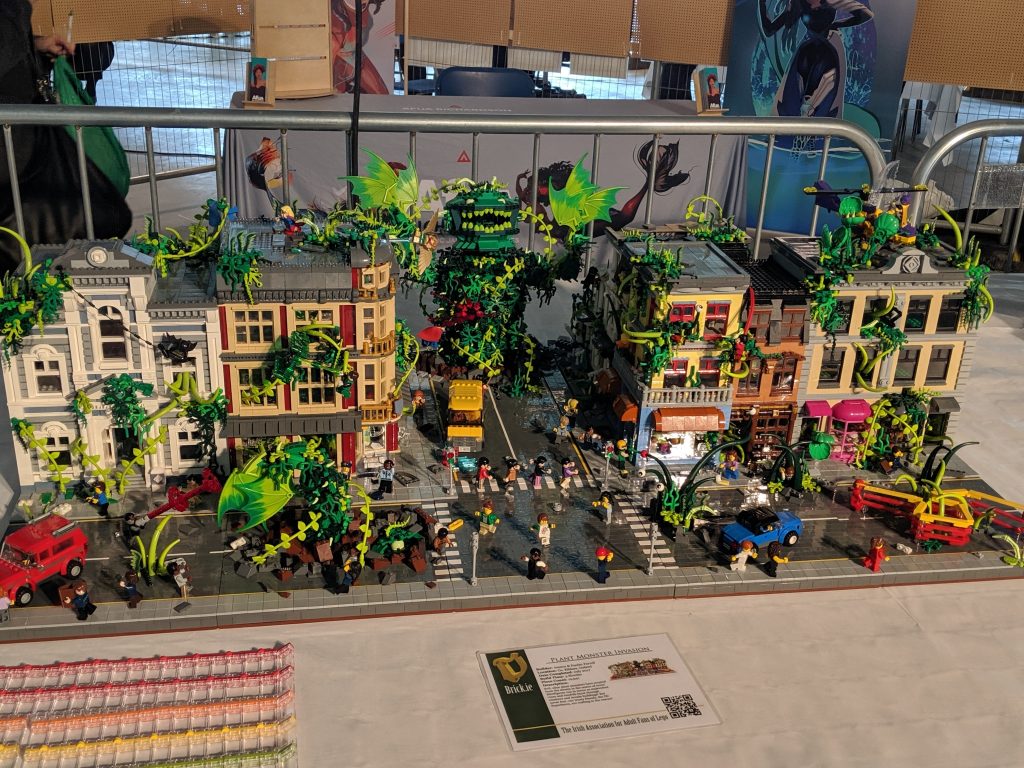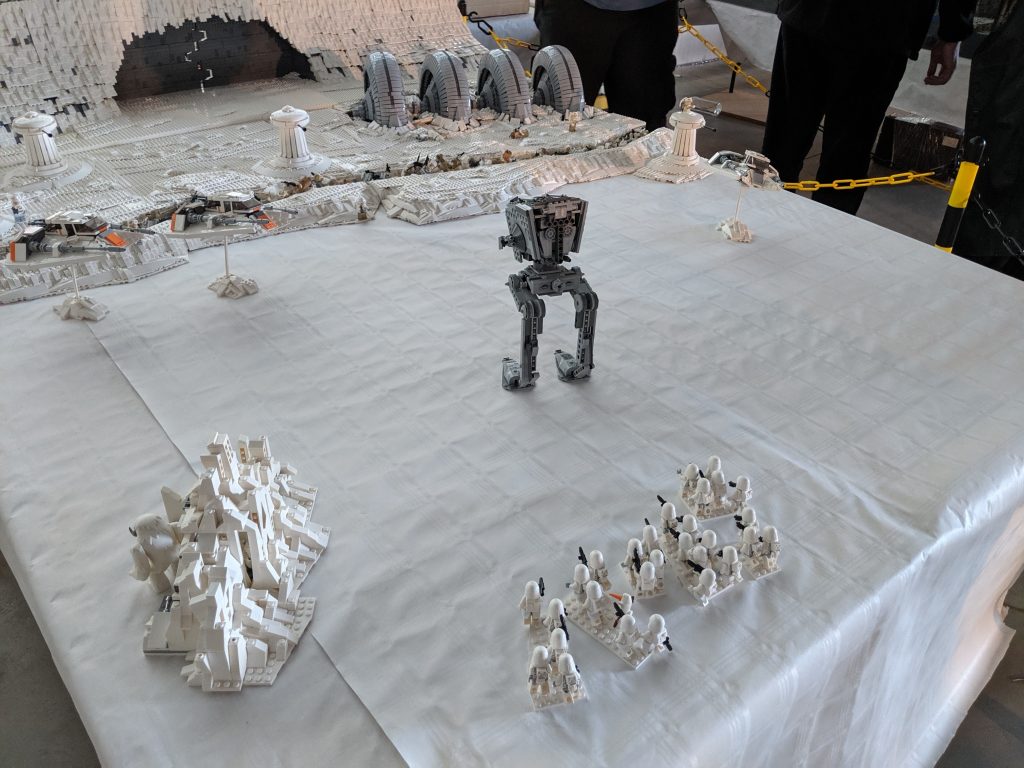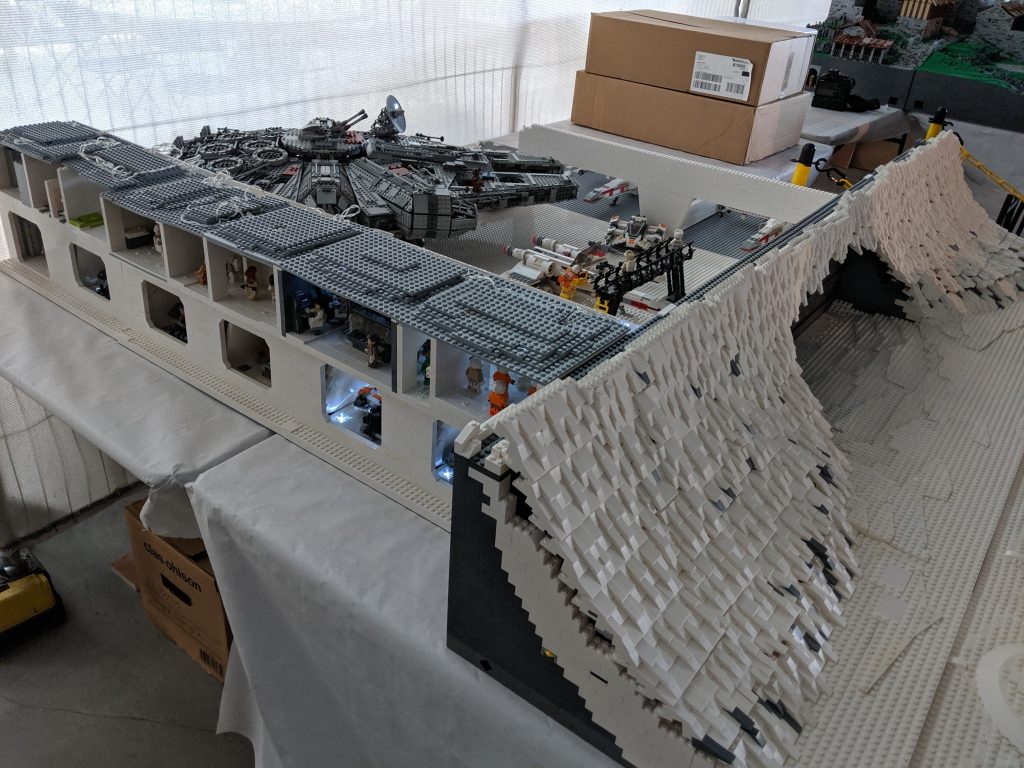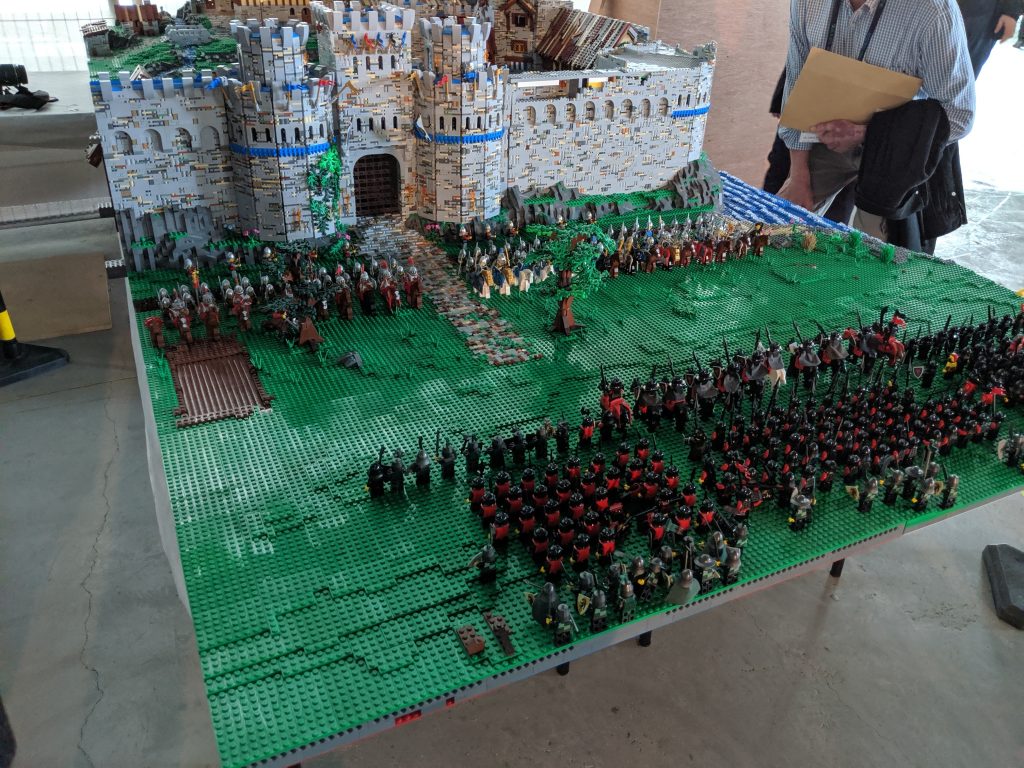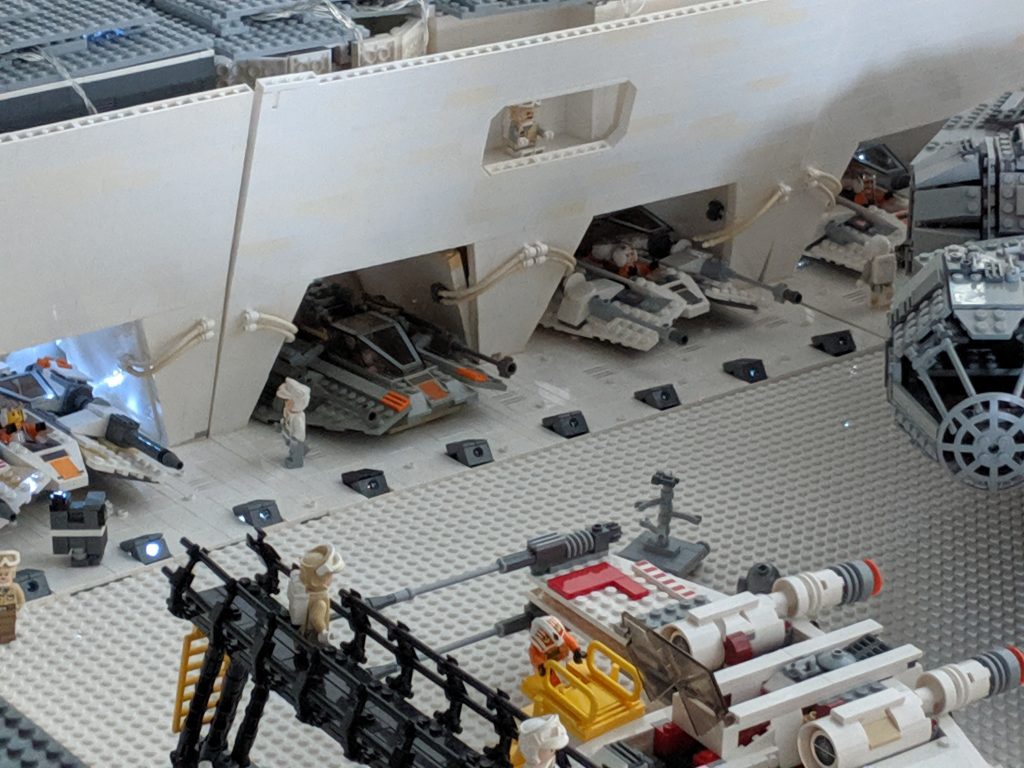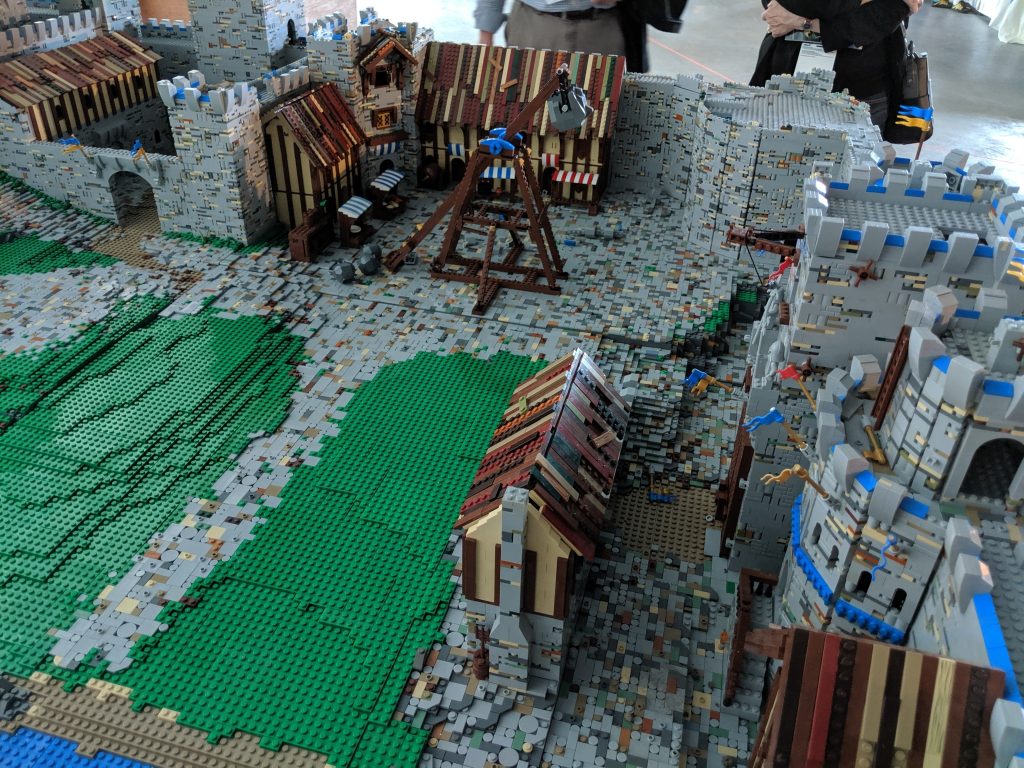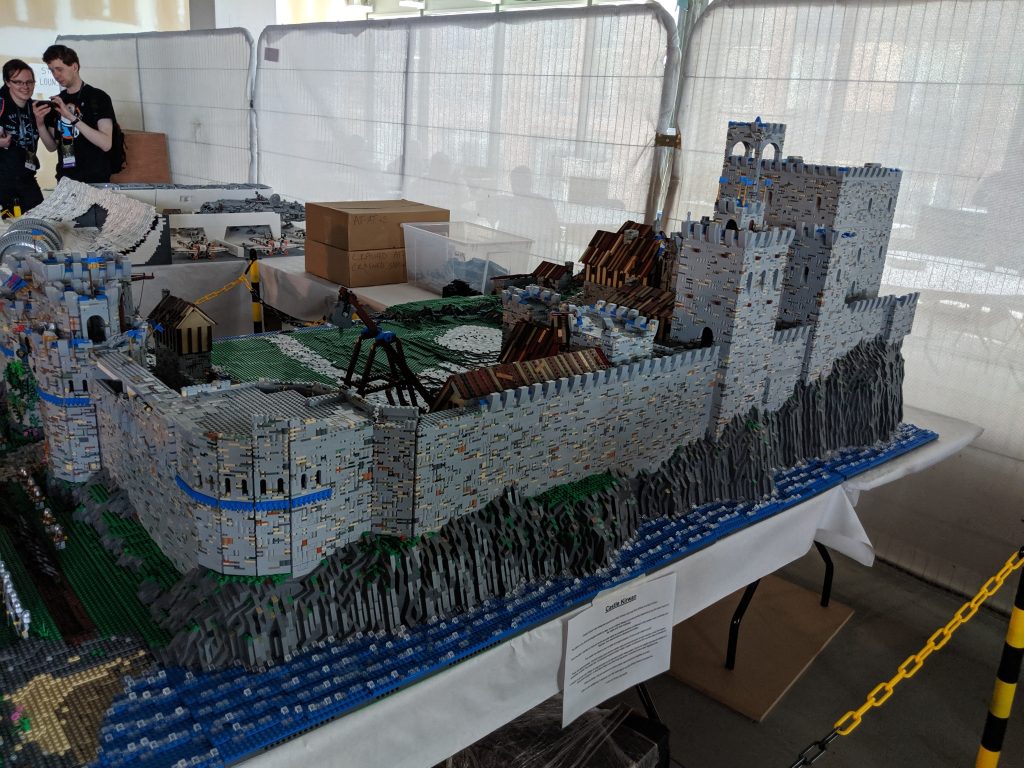An Irish WorldCon
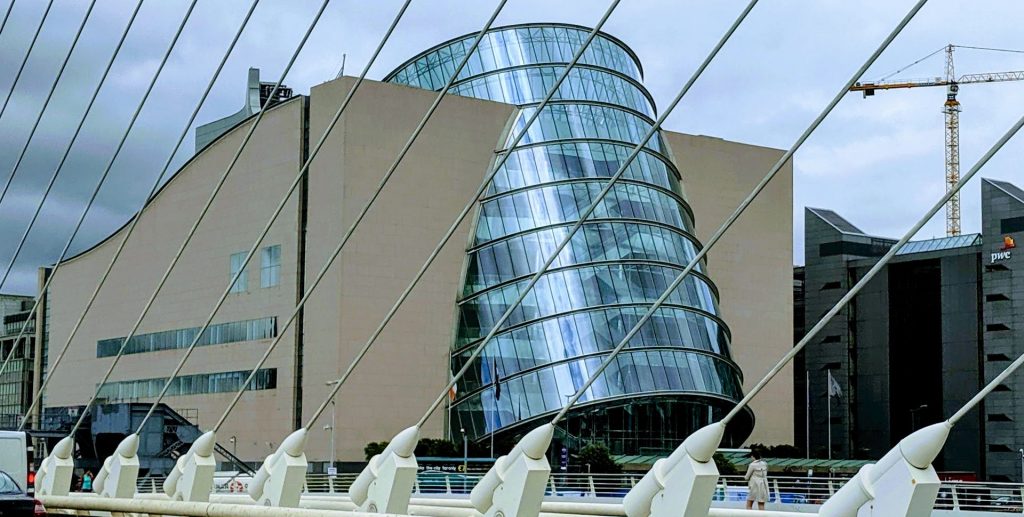
WorldCon 77 was our third WorldCon, the first two being LonCon in 2014 and Helsinki in 2017. Dublin is just a short flight away, so getting there was hardly an issue for us.
For those who don’t know, WorldCon is the World Science Fiction Convention. It really is a world convention – though many are based in North America, a good proportion are around the world, with a different city chosen each year. Next year’s will be in New Zealand.
Wednesday
Wednesday was a day for finding our hotel, getting registered and seeing a few sights around Dublin. There was one WorldCon event in the evening.
Oppy or Armstrong? Autonomous vs human space exploration
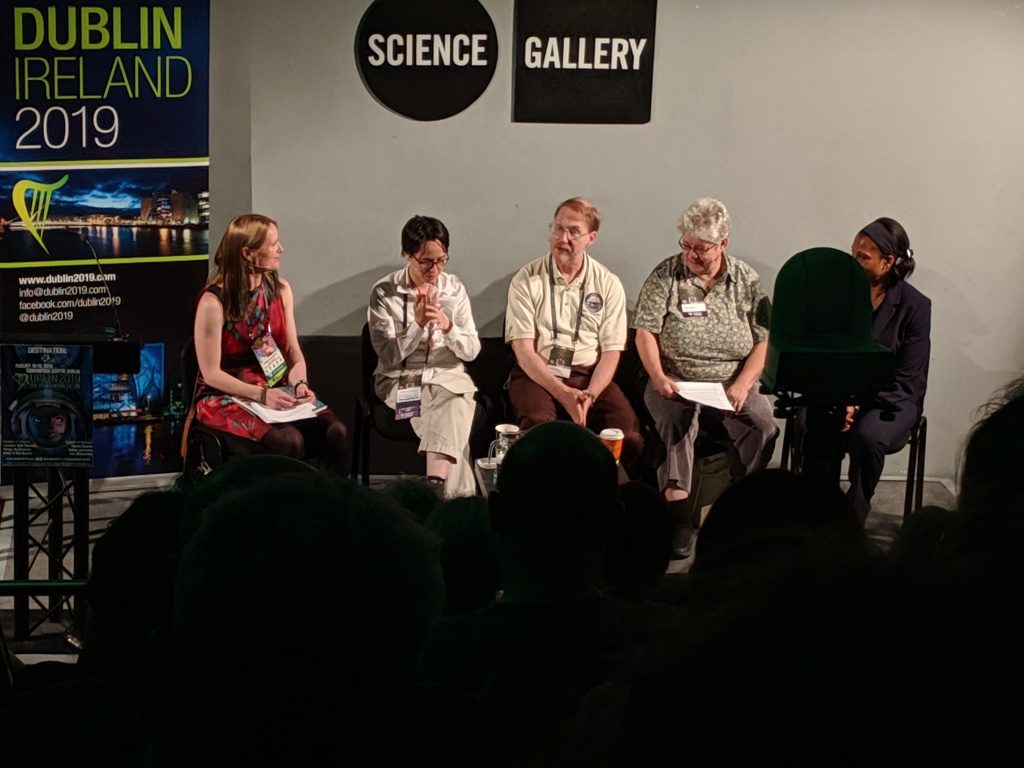
This was the first event of the con, during the evening of Wednesday at the Science Gallery. It discussed whether robot or manned space exploration was best, and it wasn’t that much of a surprise that the final consensus was that both have their uses. It was a good discussion though, especially since several on the panel were actually working with NASA as either astronauts or scientists.
Thursday
The first real day of the convention, and as expected queue management was a mess. As has been traditional, the initial plan to see lots of sessions didn’t survive contact with reality.
Retro Hugos discussion
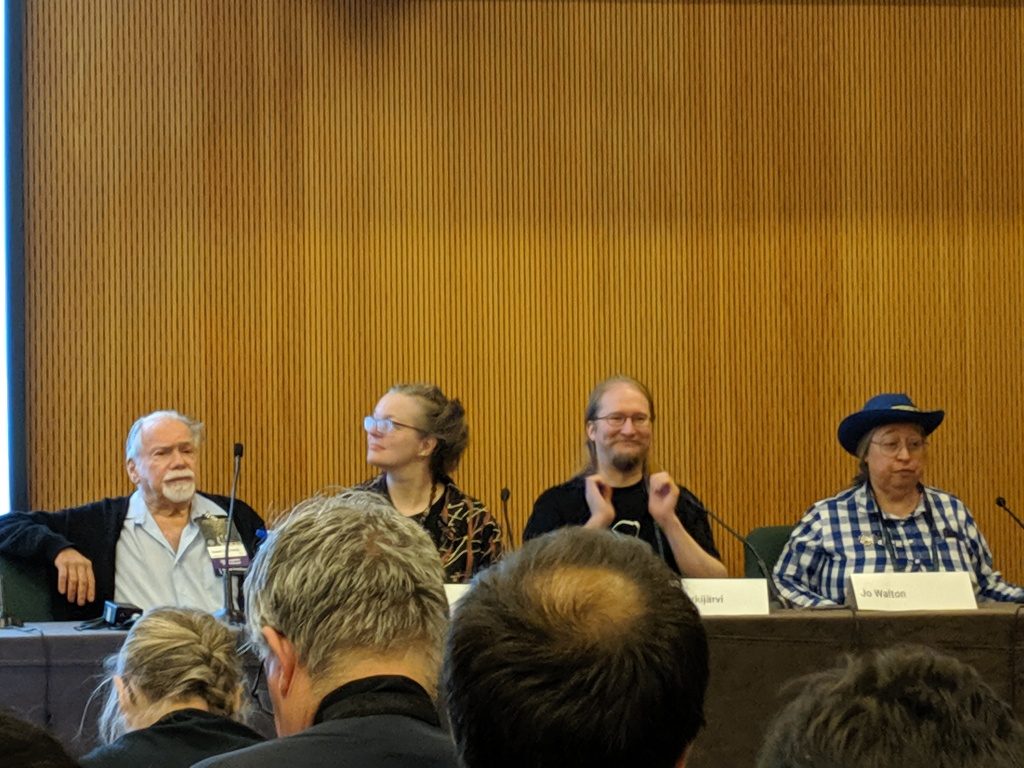
Our first session of the day was a discussion of the retro Hugo awards. These are awarded to authors who should have won awards during the years when the Hugos weren’t being awarded. This year, the retro Hugos were for 1944.
There was discussion of the novels and authors nominated, as well as a meta-discussion on how they should be awarded – should people vote based on how they would have voted in 1944, or should voting be based on modern sensibilities? An issue raised was that many people today might just vote for someone like Asimov, since they’ve heard of and read his works, when back in ’44 he wasn’t so widely known. But then, plenty of times for the modern Hugos I’ve voted for a nominee because I know and like the author, because I don’t have time to read everything, so I’m not sure there’s a difference.
Crime and punishment in the age of superheroes
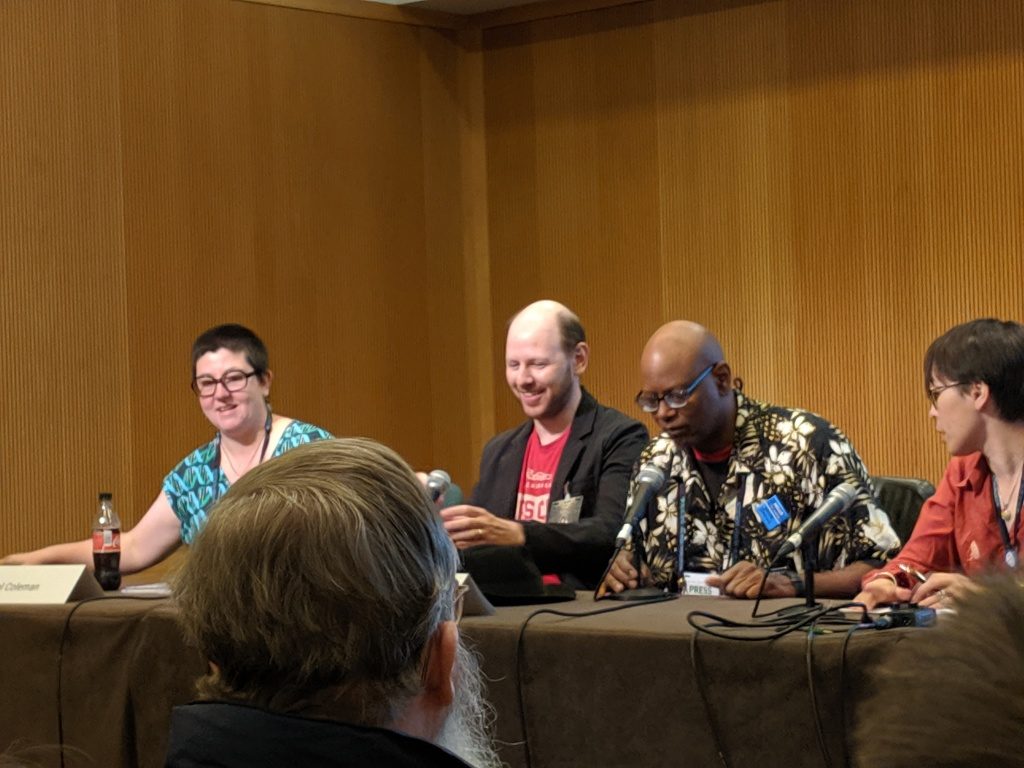
This was a light weight discussion on how (and whether) superheroes should be punished for crimes they commit. Superheroes are often depicted breaking the law, even though their intentions may be ‘good’. How do you arrest and imprison someone like Superman though?
Ultimately, it was decided that all superheroes should at least have to file a flight plan before taking off in their invisible aircraft or armoured jet suits. Also, pretty much any superhero would have their identity outed very quickly in the modern era of face recognition and selfies.
Writing robot and nonhuman intelligence
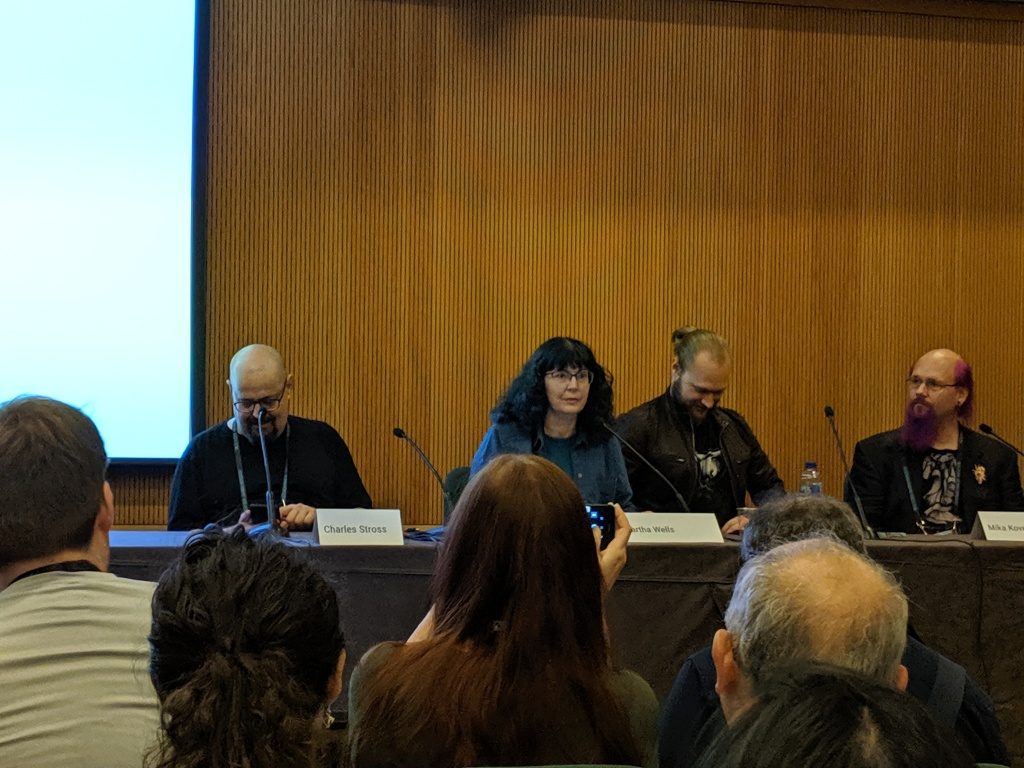
A slightly more science based discussion on AI intelligence and how it is written in science fiction. The Murderbot Diaries has been added to my list of books to read.
Ship and colonies
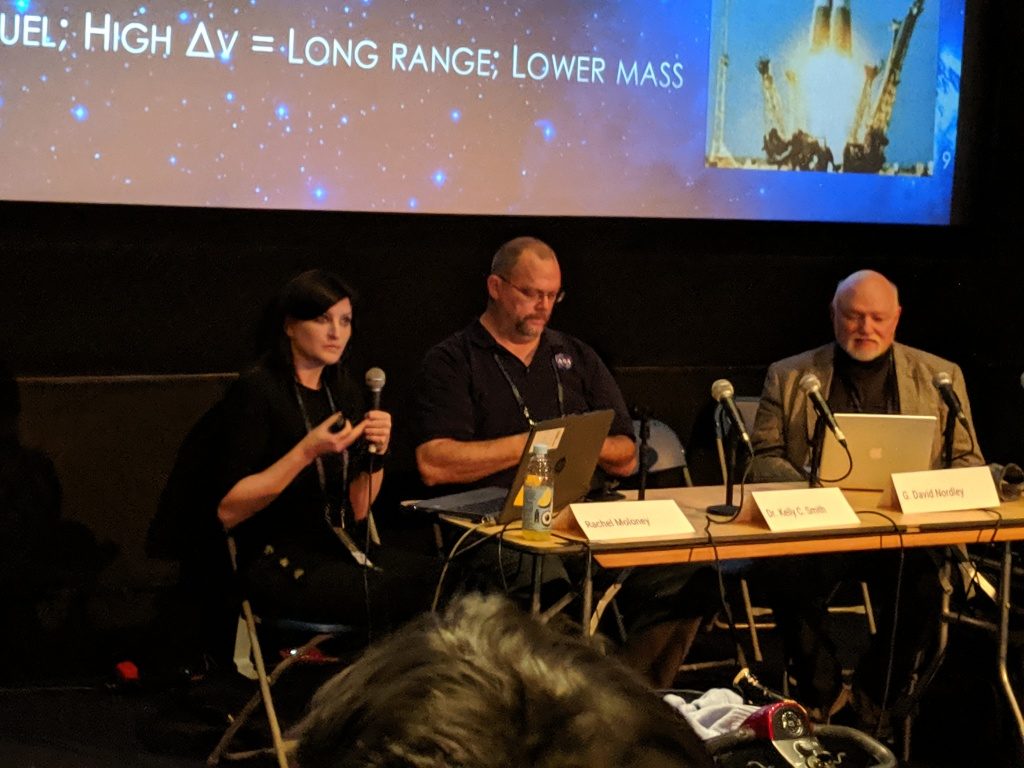
This was part of the academic track, and consisted of three individual presentations. Probably the most interesting subject was on Electric Propulsion, and Rachel Moloney obviously knew her stuff, but was a bit nervous on the presentation.
The other two subjects, on Interstellar Commerce and Space Colonies were more woolly, but had more experienced speakers.
How to self-publish your roleplaying game
A small, friendly session giving ideas and advice on how to publish your own role playing game, by Cathriona Tobin (from Pelgrane Press) and Gregor Hutton. I don’t have a plan to publish anything (other than sticking free PDFs on my website, which I’ve been doing since the 90s, which apparently does count), so I was attending this one just out of general curiosity rather than a need.
Beyond Dungeons & Dragons
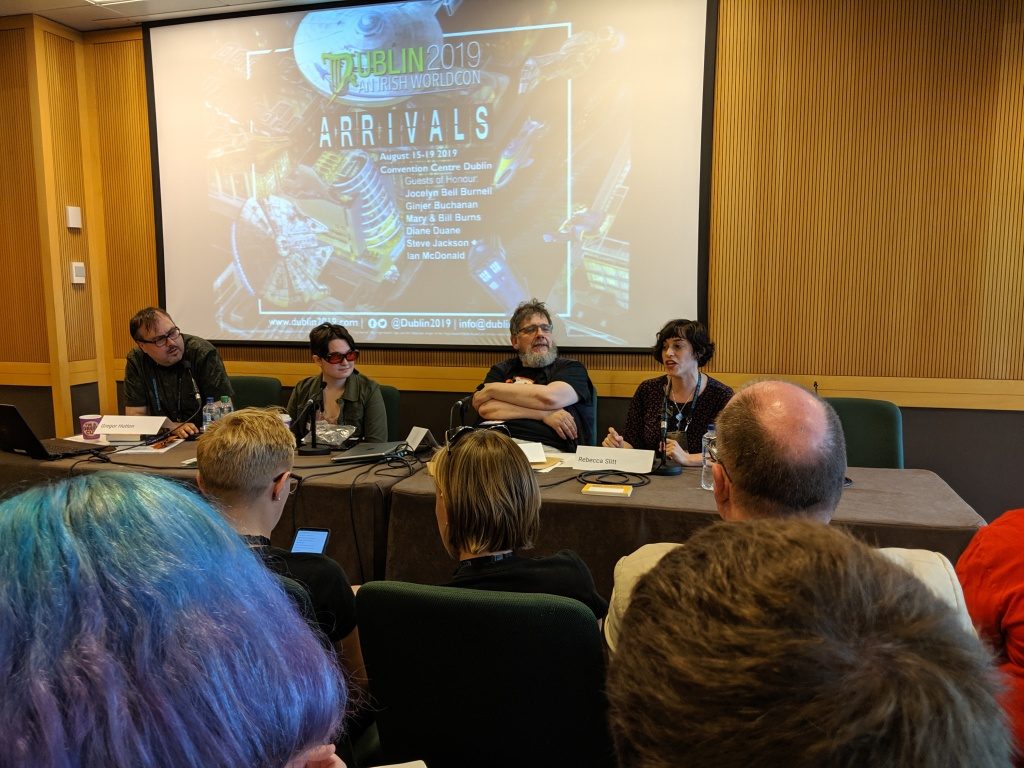
This was the last session I attended on Thursday, and was a look at some of the alternative games to D&D. For me, it was a bit disappointing, since most of the discussion was about very non-standard games (such as Monster Hearts or GM-less games). Only one of the panellists mentioned more traditional alternatives, such as Runequest or GURPS.
However, they were good presenters and full of energy, so it wasn’t boring even though it wasn’t quite my thing. I think that’s the important thing about WorldCon panels – they often diverge off onto topics you weren’t expecting, but as long as the panellists aren’t boring, it’s not really a problem.
Friday
Second day of the Con, so the staff were beginning to realise they needed to do something about the queuing. This meant queuing was more organised, but not necessarily better. There was lots of confusion, especially given that each floor had ‘Rooms’ and ‘Halls’, so something could be in ‘Wicklow Room 1’ which was different to ‘Wicklow Hall 1’. A lot of people didn’t realise the distinction, so ended up in the wrong queue. But that’s the fault of the convention centre rather than the con staff.
Space opera: boldly going where no genre has gone before!
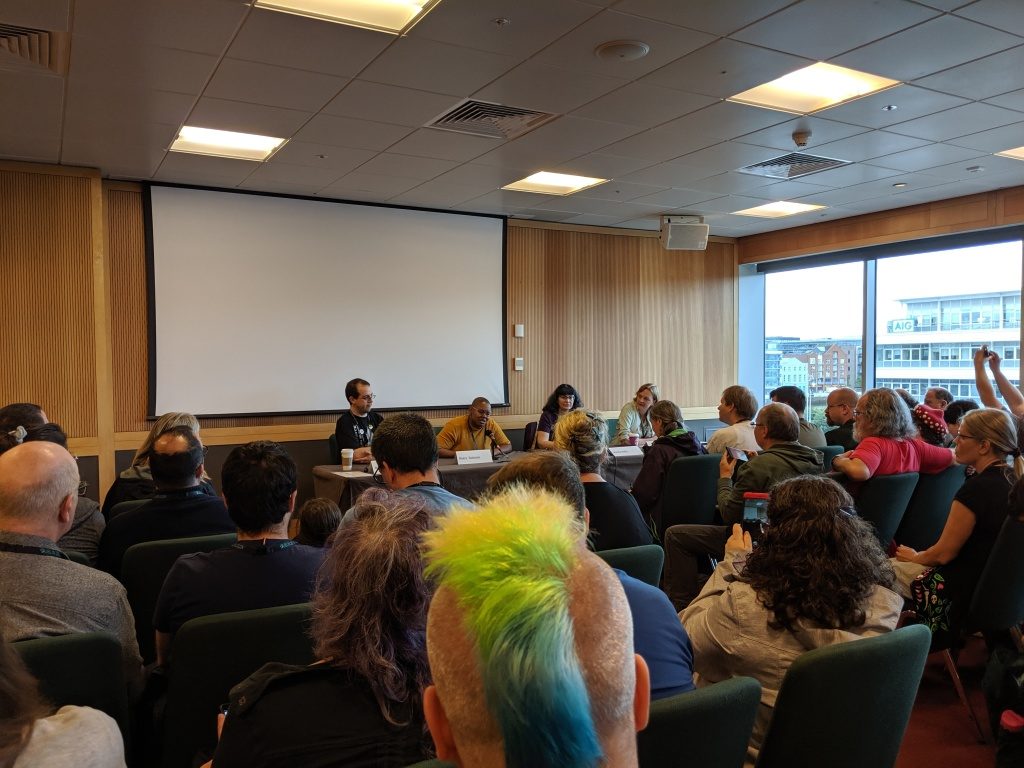
Maybe there should be a rule banning discussion of Star Trek for these sort of things, but maybe that’s my prejudices showing through (I’m not sure I’d label Star Trek as ‘space opera’). No mention of EE ‘Doc’ Smith until I mentioned him, where it was admitted that he probably started the whole genre. Ann Leckie and Iain Banks were amongst the authors mentioned (plus others I had hardly heard of).
The impact of Kickstarter on the gaming industry
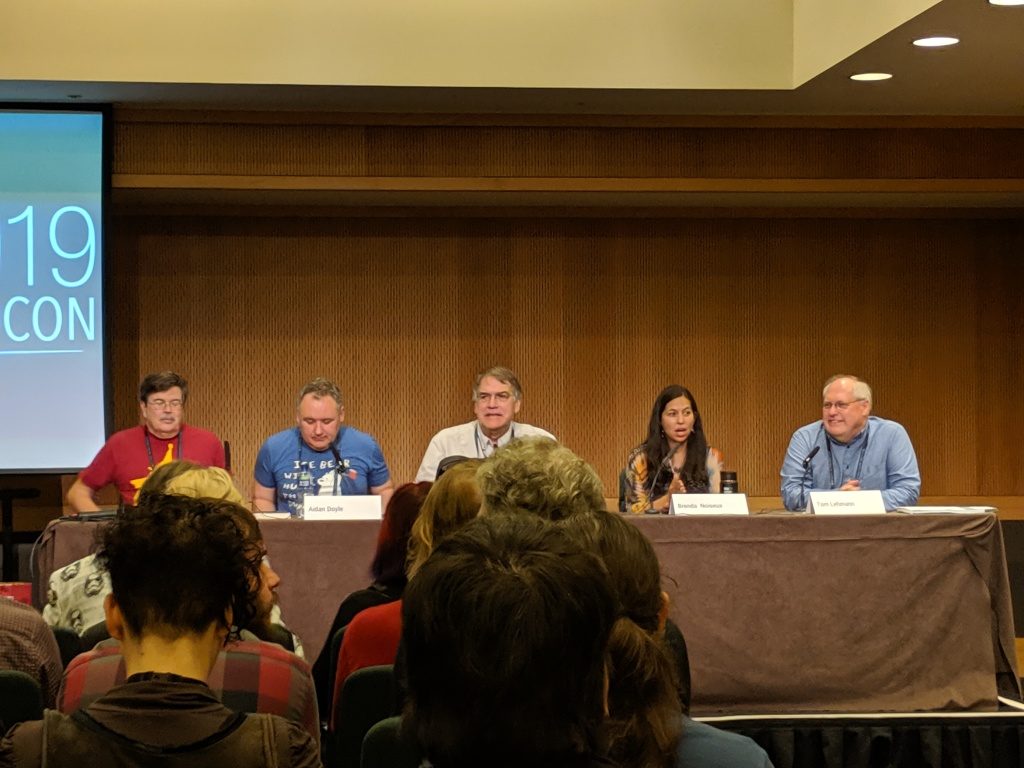
A talk by some industry veterans on how Kickstarter (and other crowd sourcing tools) has affected what they do (if at all). And yes, Car Wars is coming to Kickstarter. An interesting look behind the curtains.
Department of Cosmic Horrors
Most of Friday afternoon was taken up in an RPG session, which I’ve already discussed, where we played employees of the Department of Cosmic Horrors. Nobody died.
WorldCon Philharmonic Concert
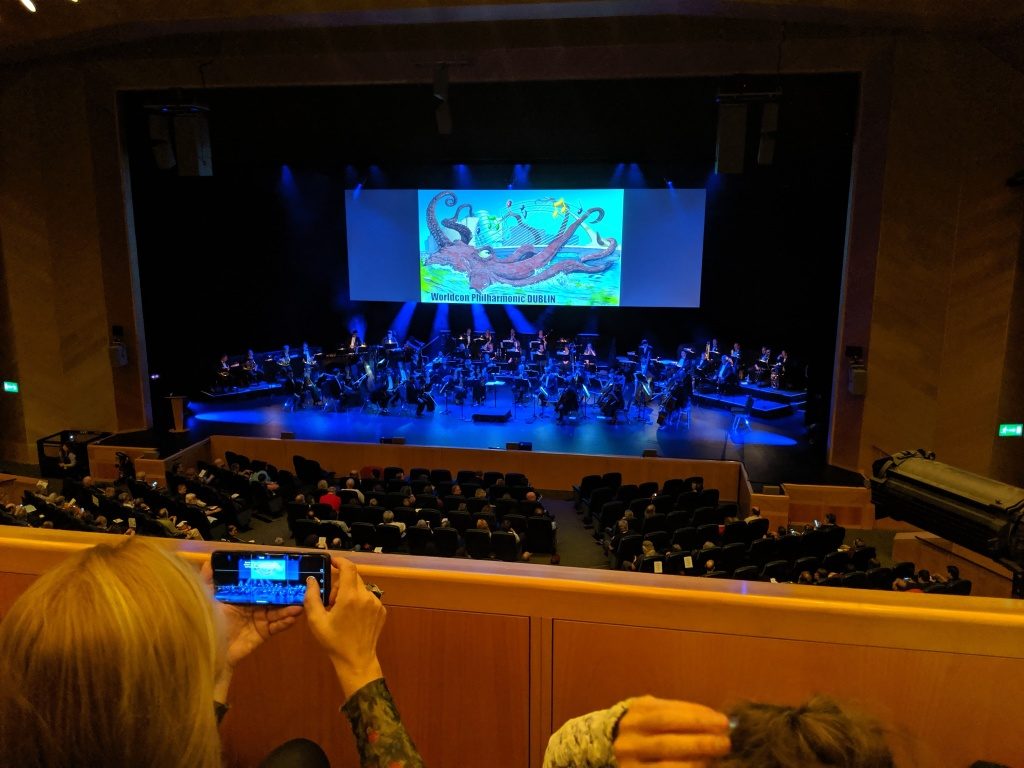
Friday evening was spent at the orchestra – listening to science fiction related tunes such as Game of Thrones, ET and Star Wars, as well as some Irish inspired themes.
It was a lot of fun, and the orchestra was good. Some of the transitions between the different scores could have been smoother, but the music itself was excellent. Queuing up early for tickets to this meant we got some decent seats up in the balcony.
Saturday
A slightly lighter day today, since we had to get something to eat before going to the cinema in the evening. Queuing was beginning to get a bit more organised, and they were beginning to count queue sizes, so people knew whether they had a chance to get in or not.
How astronomy might break physics
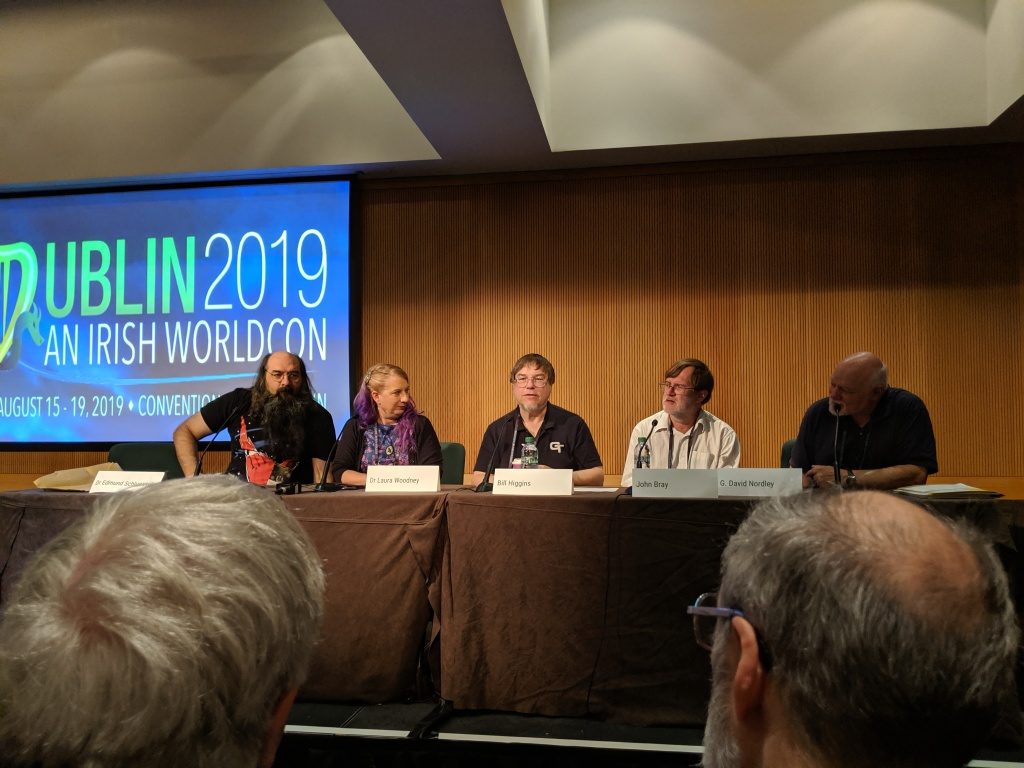
A panel discussion on how astronomical observations are ‘breaking’ physics. Of course, it was mentioned that they don’t actually break physics, they just provide more observations which allow us to fine tune our theories.
A discussion on missing neutrinos, dark matter and energy, extra solar planets and other subjects. A good discussion by people who knew what they were talking about.
Artemis: Apollo’s big sister
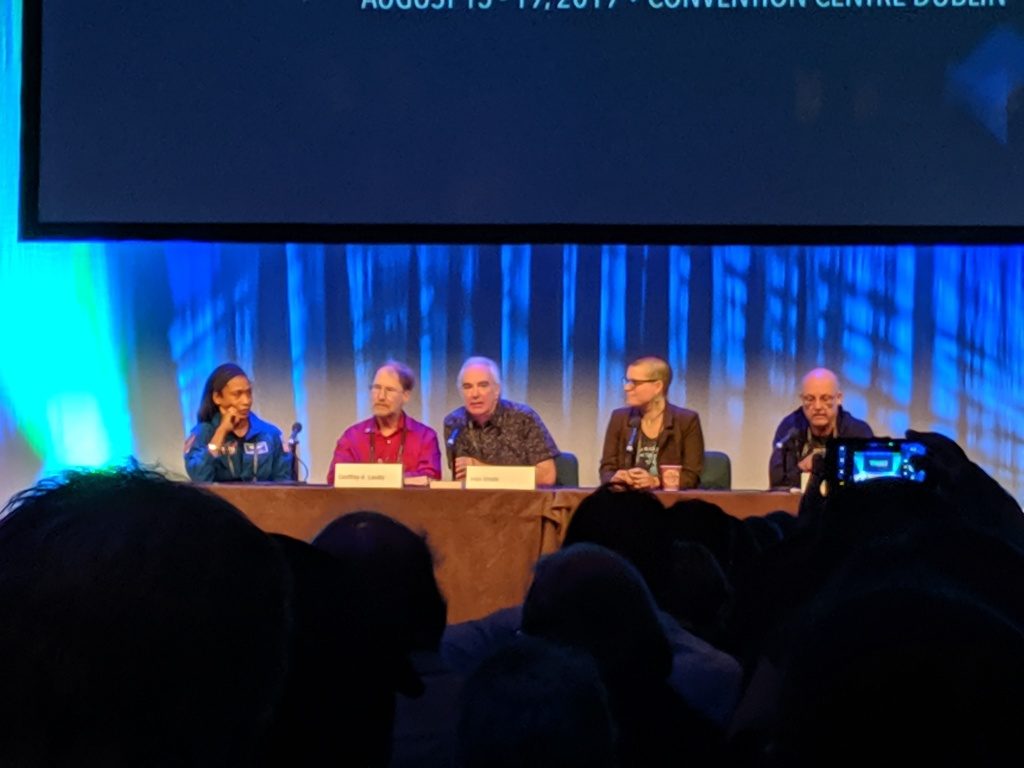
A panel discussion on NASA’s Artemis project – an attempt to return to the Moon. There was some interesting talk on the plans for the Gateway station, and it also delved into the political realities of whether things would actually go ahead.
The Eldritch Accountant
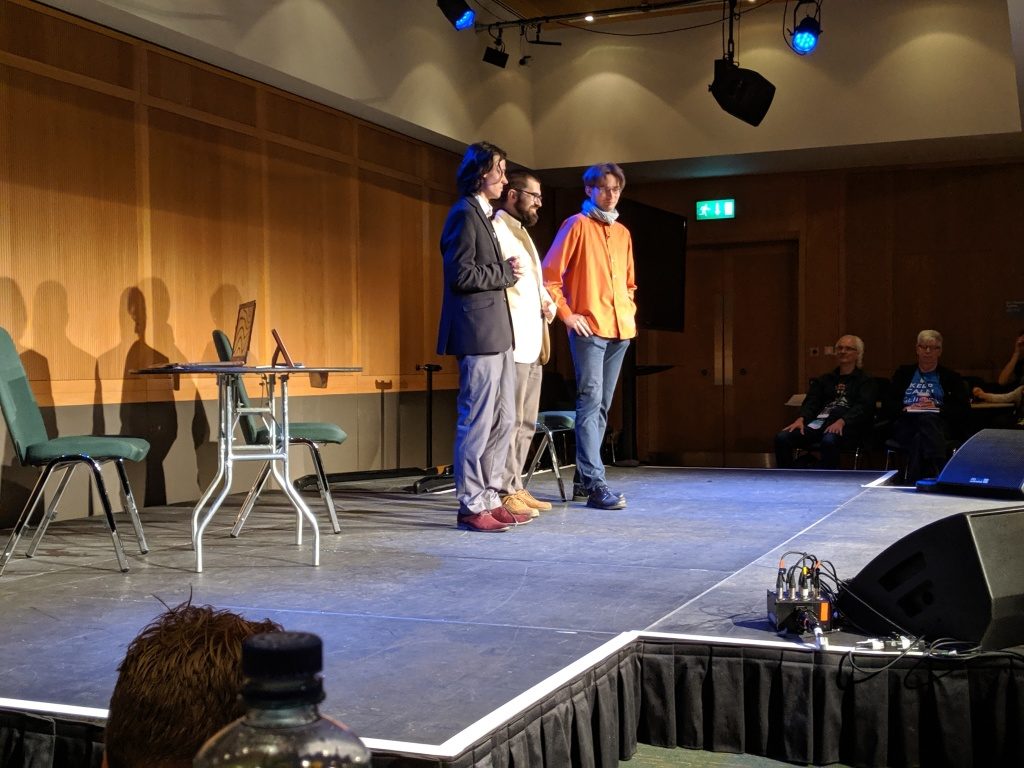
A strange but amusing play about the need to make the monthly quota on ritual sacrifices and marketing your somewhat unusual services – another session which seemed very Laundry Files in its subject matter. One of the actors hadn’t managed to make it, and they cleverly worked that into the plot.
Technology we can’t believe we’re still using
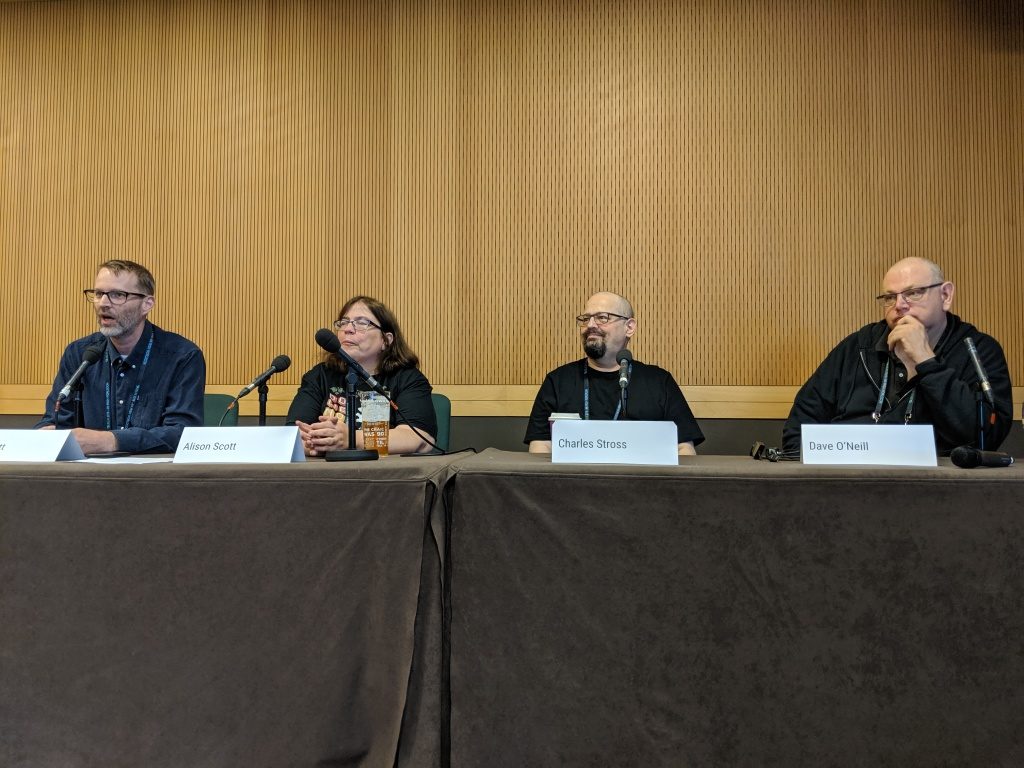
Panels like this can be amusing and interesting, but have to be taken with a pinch of salt – they often involve a group of lay people talking about subjects which they have very little knowledge in. The panel’s discussion on telecoms almost caused one audience member to explode it was so wrong.
However, it was a fun panel, with discussion of cars, telephones, fossil fuels and other technologies we may have expected to have been consigned to the scrap heap long ago, but which have somehow survived.
Forbidden Planet
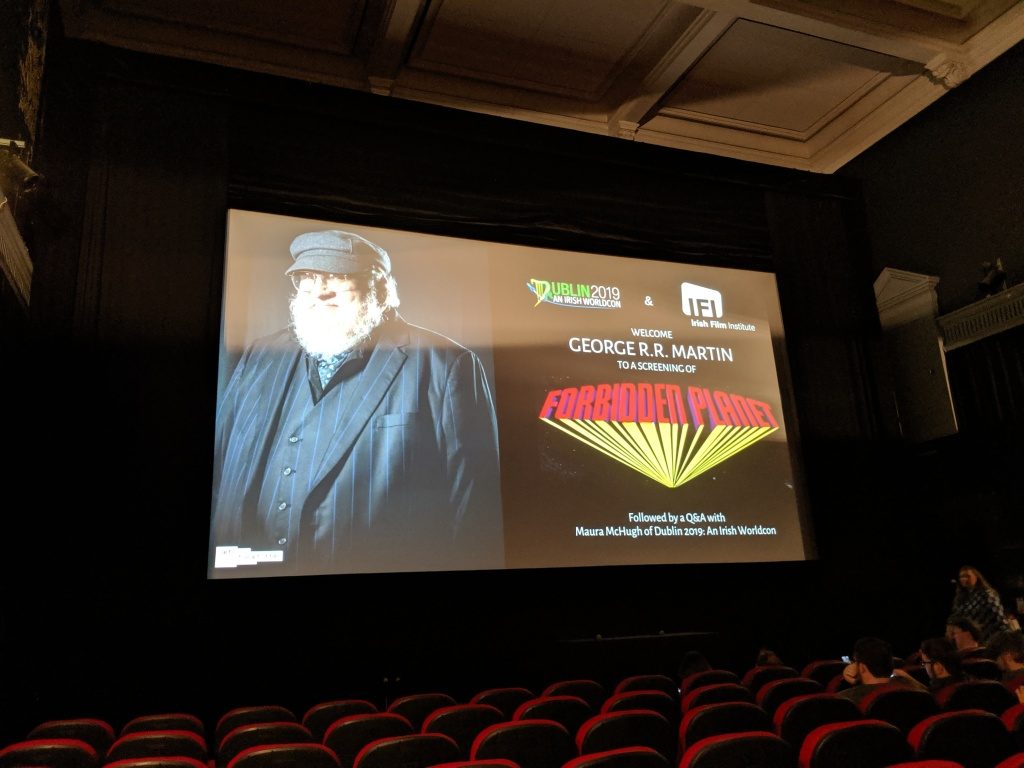
The evening was spent at the Irish Film Institute watching Forbidden Planet with George R.R. Martin, followed by a discussion with him about his love for the film, and others like it.
I hadn’t seen the film at the cinema before, so it was good to see it on the big screen. For a film based in the 50s, it has stood the test of time remarkably well – at least from a technical and SFX perspective. Social mores may have changed a little bit since then.
The most amusing part though was that we managed to get to the cinema early, and were first in the queue. Sometime later, some guy started chatting to us, who very obviously had no ticket and was trying to sneak in when we went in. Fortunately a couple of the WorldCon staff noticed what he was up to before we had to say anything, and politely dragged him off.
Sunday
Concert: Another Castle
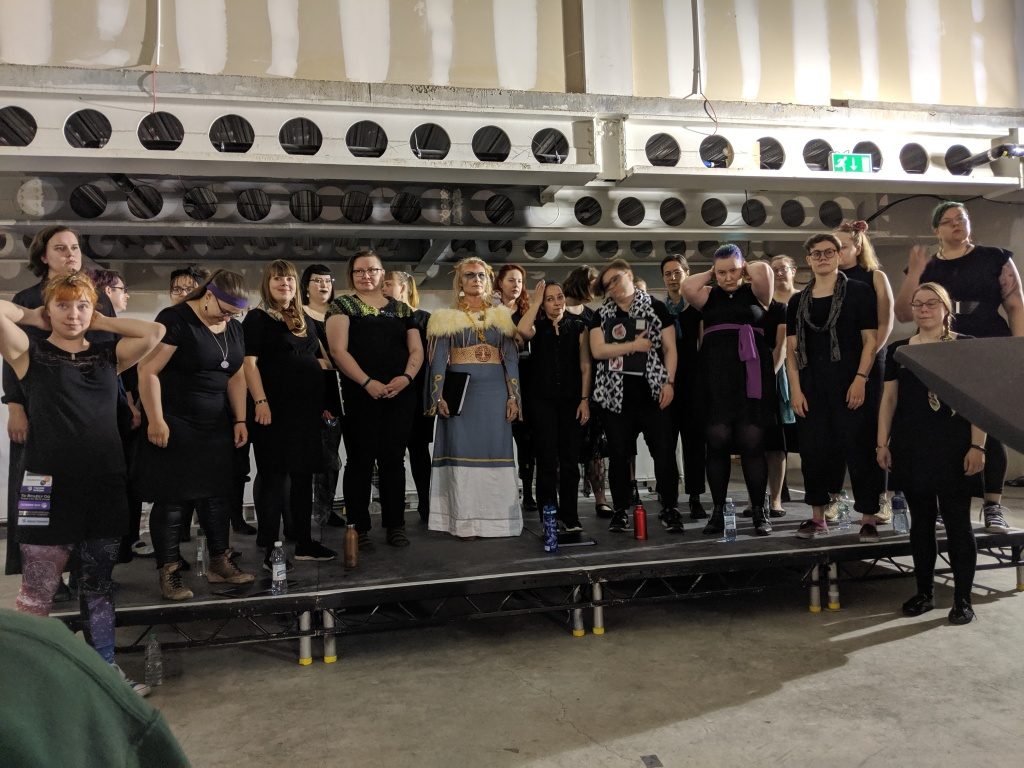
When we were in Helsinki for WorldCon 75, I wanted to go and see the acapella women’s choir Another Castle. Unfortunately they clashed with a panel I was on, so I didn’t see them. Fortunately, they came over to Dublin for this WorldCon, so our first event for Sunday morning was listening to them.
They are a fantastic and enthusiastic group, who sing music from various SF and fantasy works. I made some recordings of them which are over on YouTube. Given that it was 10am on a Sunday morning, the choir was pleasantly surprised about the number of us who turned up to see them.
All of biology in 60 minutes or less
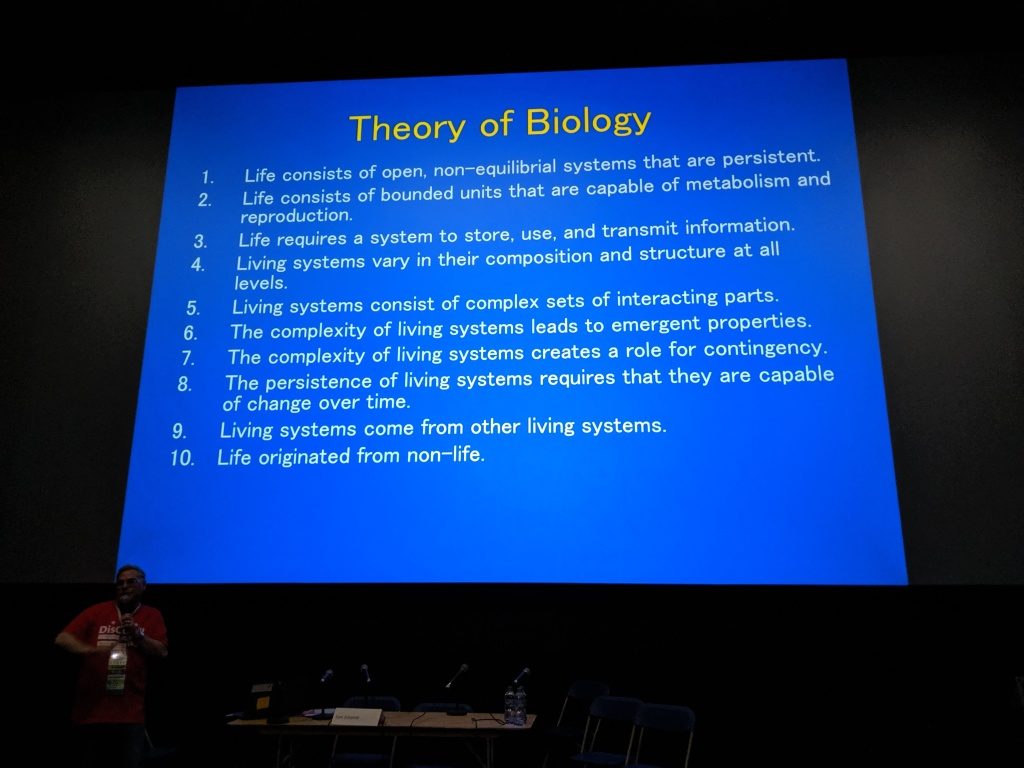
For the afternoon, it was back on the academic track, with an interesting presentation on biology and how it relates to creatures and life forms in science fiction.
Things that SFF writers often get wrong: logistics
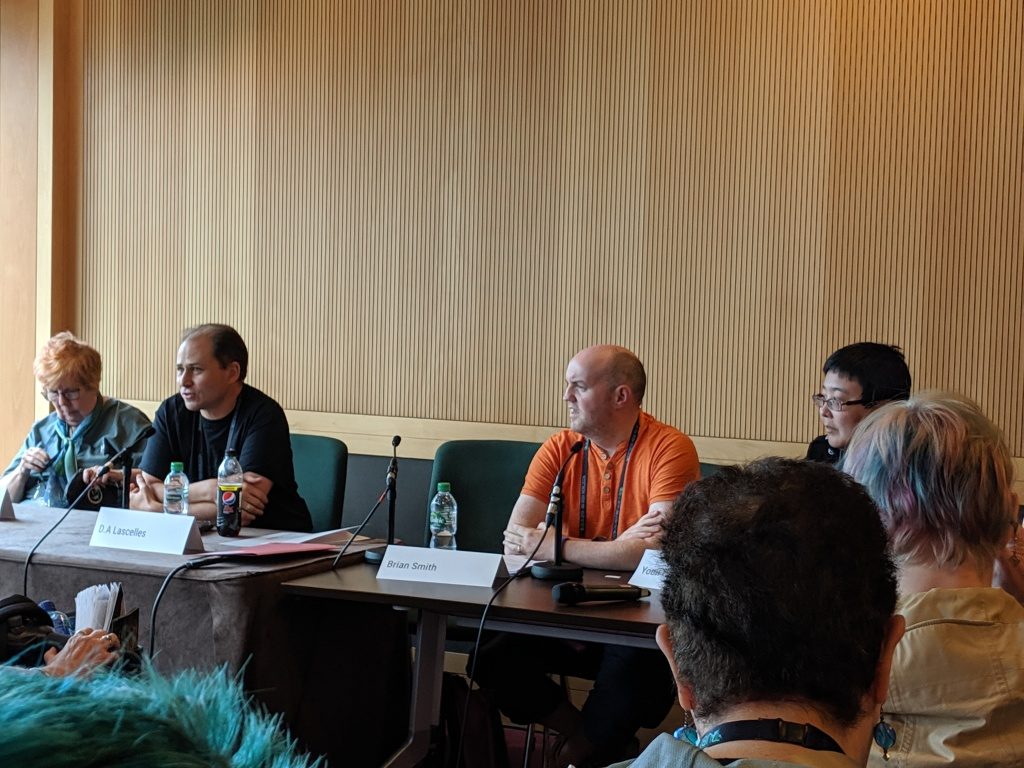
Logistics is one of those subjects which is often ignored in science fiction and fantasy, so this was a discussion on examples of works where the author obviously hadn’t thought about exactly how an army was going to be fed, or potentially worse, had done so and felt it necessary to describe their working to the reader.
Quite an interesting discussion, and of course I had to mention Babylon 5 where logistics was part of the plot on a couple of occasions.
Intelligent others in SF
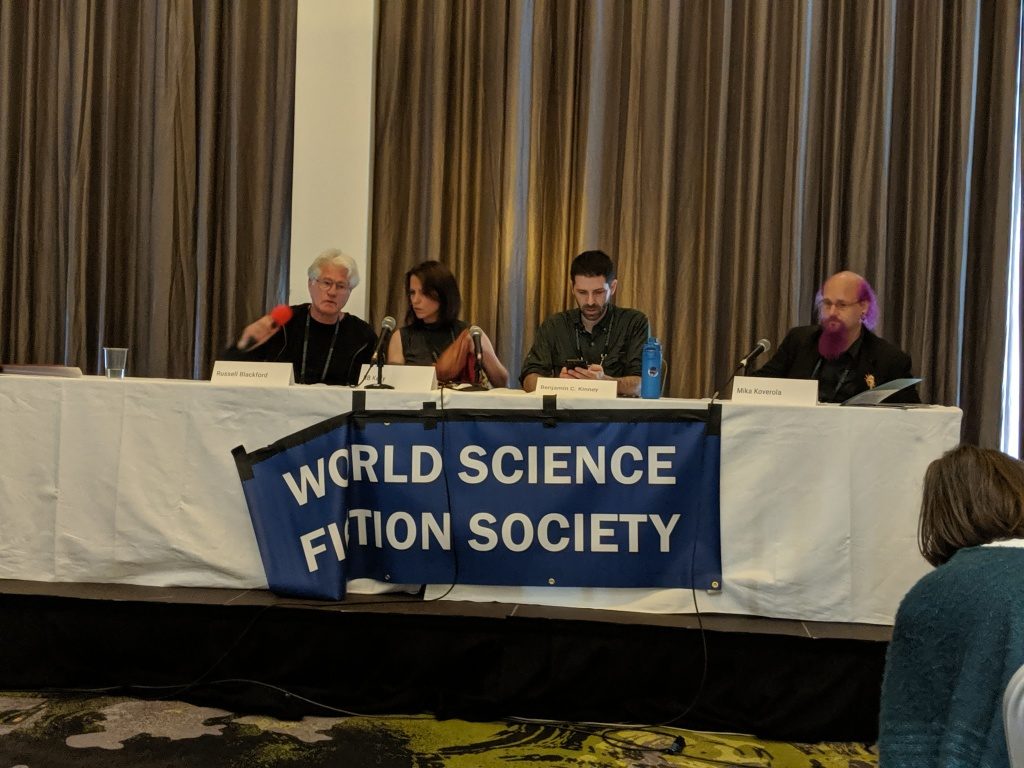
A panel discussion on portraying alien and robot intelligence in science fiction, and where it had been done right or wrong.
Will we ever achieve sentient AI?
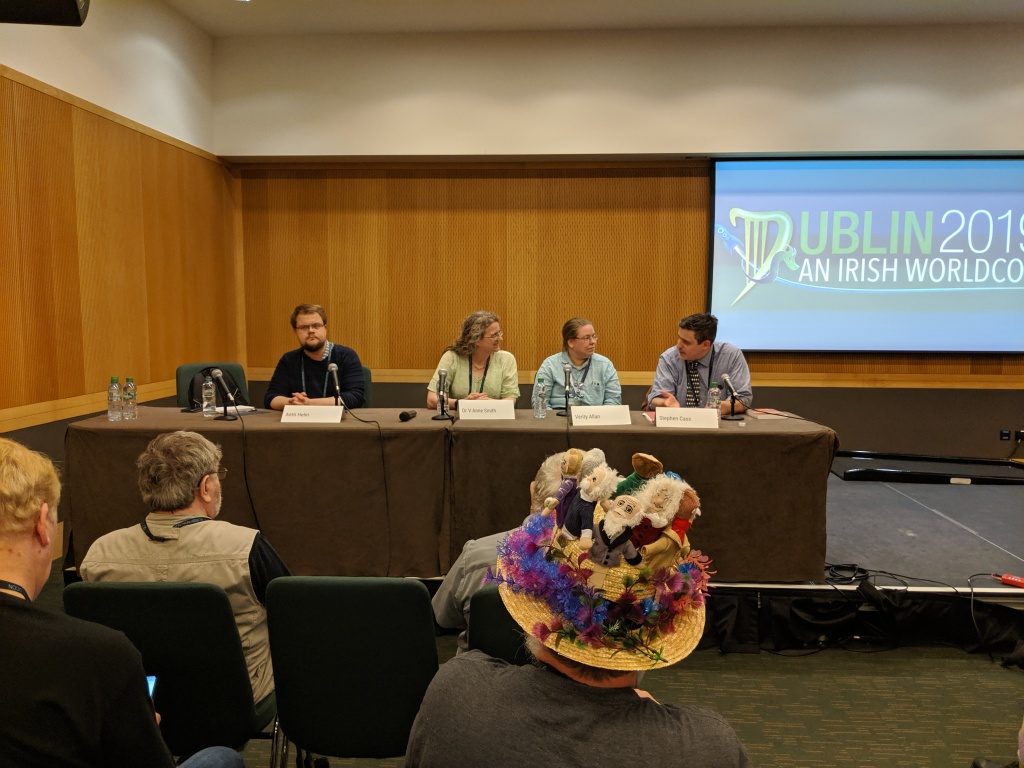
My final Sunday panel was on Sentient AI, and whether it was likely, or even moral. The panellists seemed to be reasonably clued up on the subject, and discussed things from specific AI to more general sentient AIs. Out of the various panel discussions I saw on the subject at this con, this one was probably the best.
Monday
We normally leave on the Monday, but decided to stay another day. A lot of people do leave on the Monday, so it tends to be a bit quieter than the other days. Which made the queuing situation a lot better.
In conversation: Jocelyn Bell Burnell and Norah Patten
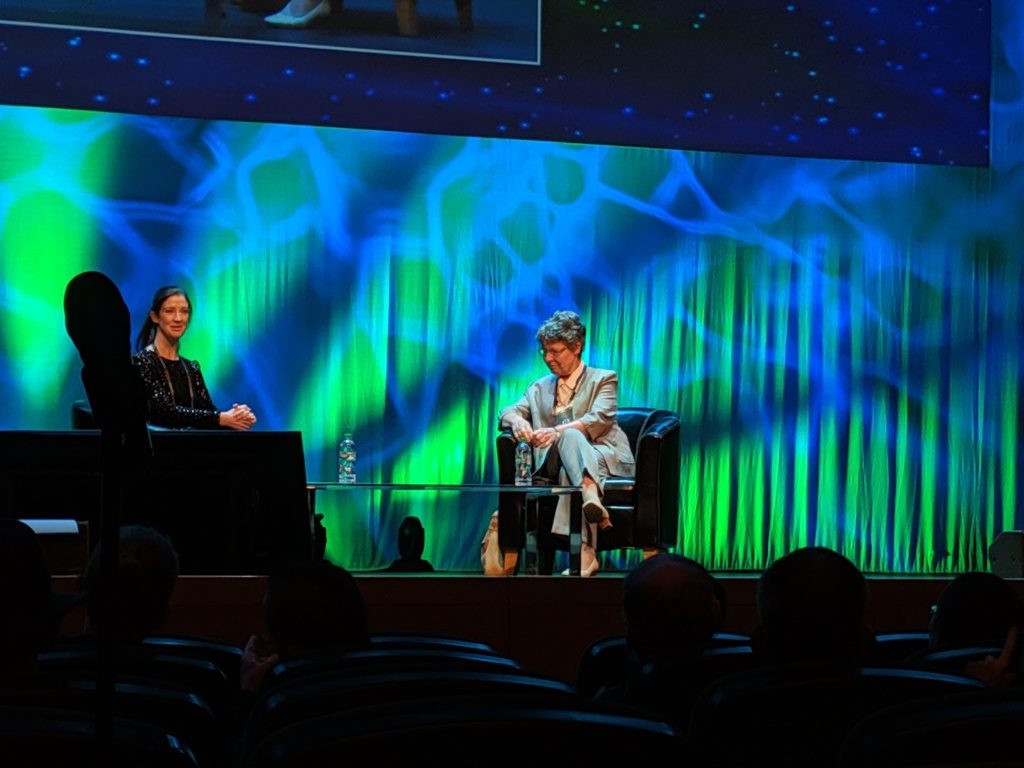
I had avoided (due to clashes) presentations by Jocelyn Bell Burnell on the other days, so it was good to see something she was in that wasn’t specifically about pulsars.
I felt the interviewer did far more talking than she should when asking the questions (the interviewee should be doing all the talking), but it was an interesting view into her life, and the cultural changes (I would hope) that have been made since then.
Beyond Pluto to Ultima Thule: NASA’s New Horizons
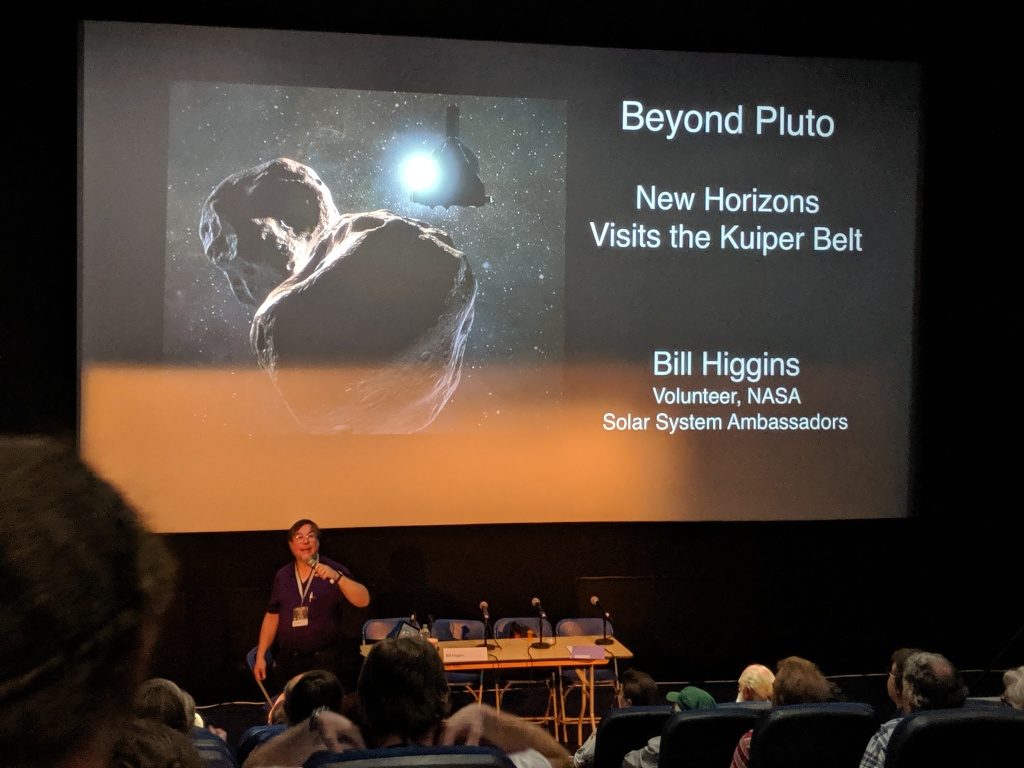
A presentation by Bill Higgins on the New Horizons mission to Ultima Thule (which isn’t officially Ultima Thule yet). He’s been on a number of panels over the last few days, and he’s a good presenter who knows the subject, so this was a good presentation, though it didn’t really cover much which isn’t already known to anyone who has followed the mission.
Dystopias
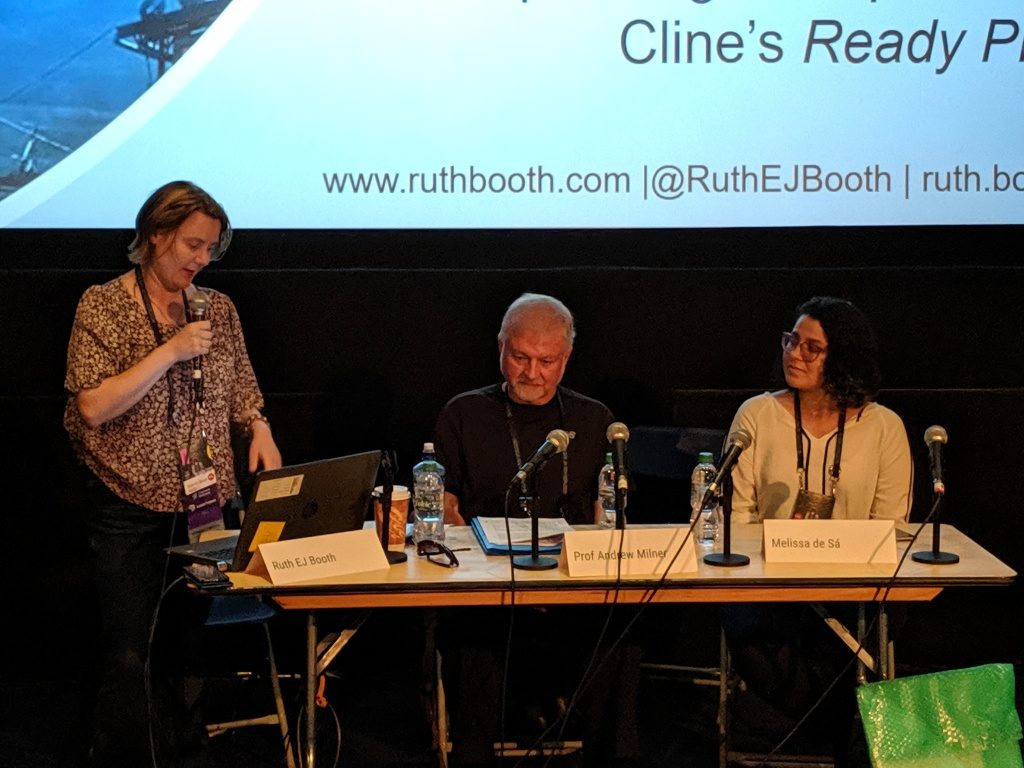
Three academic talks on how Dystopias have been portrayed in science fiction. I should have guessed from the titles really, but not having seen any of the referenced works meant it wasn’t as interesting as it could have been, but there was some good discussion, especially about online societies.
Powering a future with a stable climate
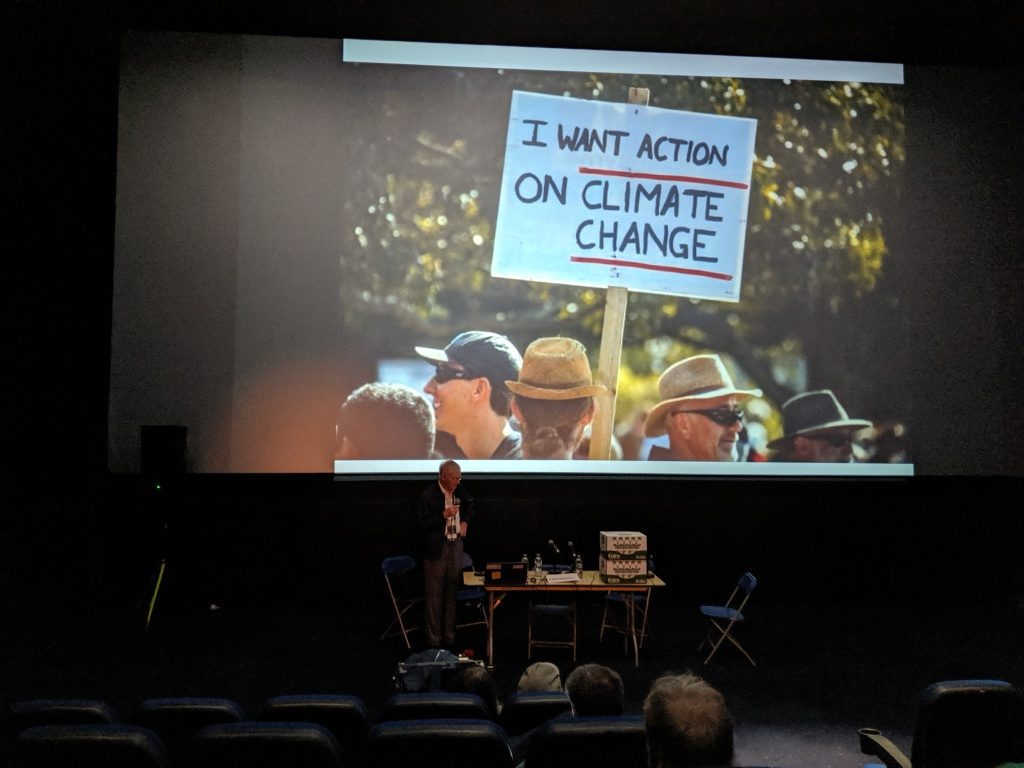
A good presentation on the numbers behind some of the alternatives to fossil energy sources for powering our future, which actually make for a depressing read given just how good fossil power is in terms of efficiency and portability. Even nuclear power requires building an awful lot of power stations.
Medical effects of radiological and nuclear weapons
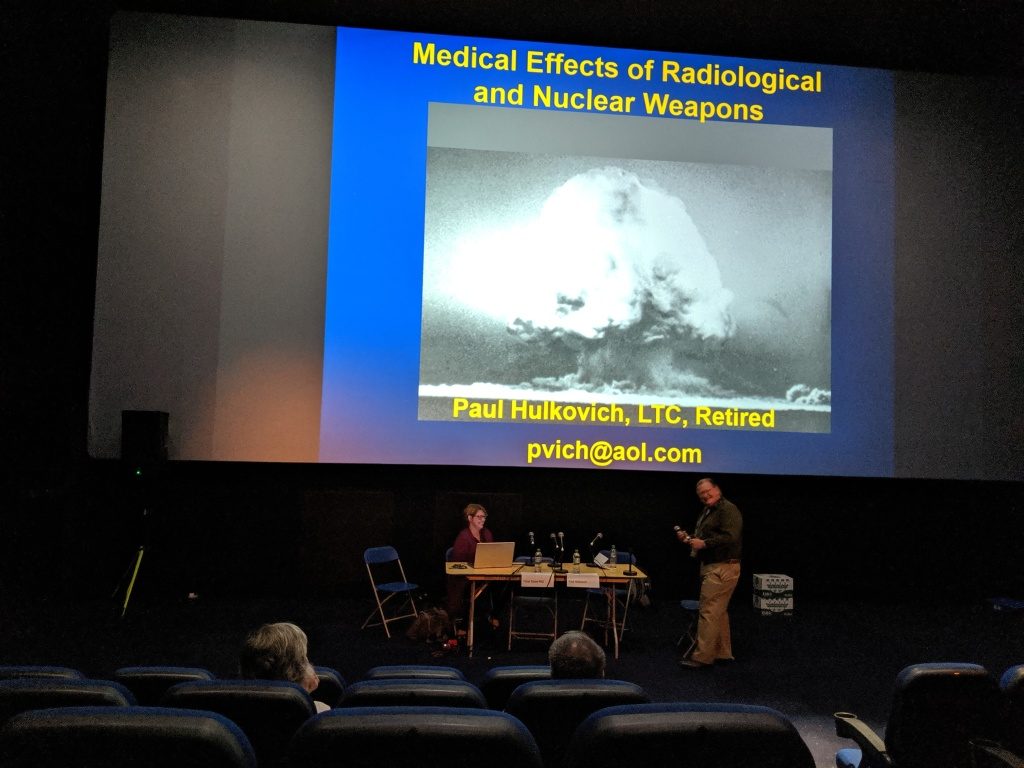
We ended the con with a cheerful presentation on the effects of nuclear weapons on the human body. There were some rather graphic photos, but a good in depth discussion. The only problem was that I had to do a lot of on the fly conversion from rads/rems to Grays/Sieverts to be able to make sense of things. Surprisingly, neither presenter had see the recent Chernobyl series so were unable to answer the obvious question (not by me) on how accurate that had been.
It was a good scientific end to the convention though.
Overall
Dublin 2019 was a great con, and I’m glad we attended. The convention centre could have done with being larger (our first con, LonCon at the ExCeL centre, was probably the best location since ExCeL is huge), but there aren’t many places suited to hosting events with thousands of people like this. Changing location every year means a location doesn’t get experience in hosting the event, but that’s offset by the fact that it opens the con to far more people, since eventually there will be one in your part of the world.
There was also an art section, and though we didn’t buy any art, I have the names of a couple of artists I liked, which I may want to order a print from at a later date:
There were also some pretty awesome Lego displays, notably the Castle, which was massive.
So, it was another great WorldCon, and thanks to all the volunteers and others who made it what it was. Though I may complain about the queues, or how some sessions turned out, it was definitely worth it, and I’m grateful to everyone who took the time and effort to make it so.
